Navigation
Somalia: MSF Fighting Against Cholera, Measles, and Malnutrition
Doctors Without Borders/Médecins Sans Frontières (MSF) is currently battling outbreaks of cholera and measles in and around the town of Marere in southern Somalia.
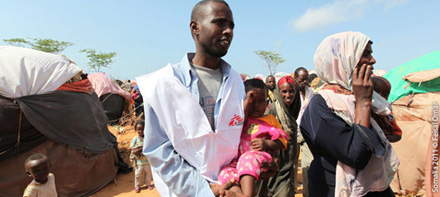 |
| Somalia: Battling the consequences of conflict, neglect and drought. Photograph courtesy of MSF |
Doctors Without Borders/Médecins Sans Frontières (MSF) is currently battling outbreaks of cholera and measles in and around the town of Marere in southern Somalia. Around five thousands Somalis fleeing conflict and drought in their villages are now seeking shelter in Marere and the surrounding villages of Jilib, Keytoy, and Osman Mo. MSF is trying to counter the outbreaks but is finding that this effort is no different from its other interventions in Somalia, which is to say that security and other matters are limiting the organization’s ability to respond to the degree that is necessary.
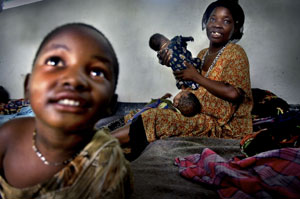 |
| At this feeding center in Marere, hundreds of children are treated every month; a measles outbreak here could be disasterous. © Magnus Hallgren |
“Since the outbreak of the measles epidemic among the displaced people, we managed to treat over 150 cases,” said Silvia Colona, MSF Project Coordinator for Marere. “Ideally we would do mass vaccination of all children in these villages. That is the only way we know to stop an epidemic among vulnerable people. Until now, this has not happened. If the authorities grant us the possibility to do mass vaccinations amongst the children in the affected locations, we can prevent an epidemic and many unnecessary deaths.”
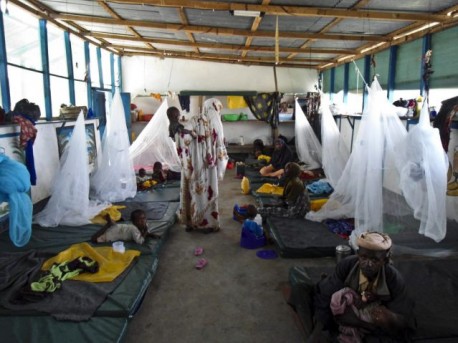 |
| © MSF National staff at work in Marere's feeding center malnutrition medical facility. Somalia: Battling teh consequences of conflict, neglect and drought. Photograph courtesy of MSF |
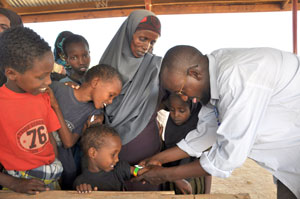 |
| A child’s arm is measured to gauge malnutrition, Daddab camp, Kenya. © Nenna Arnold /MSF |
Hundreds of thousands of Somalis have been on the move this year seeking relief from a worsening humanitarian crisis marked by war, violence, lack of development, lack of assistance, and drought. Many are malnourished and weak, and opportunistic infections—cholera and measles in particular—are rife given the lack of clean drinking water and sanitary conditions.
In addition to treating measles patients, MSF has set up a cholera-treatment center in the hospital the organization has been running for eight years in Marere.
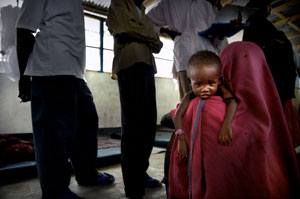 |
| This MSF hospital in Marere treats 3,000- 4,000 patients a month. It is the only structure in Southern Somalia where doctors are working and free medical care is offered. © Magnus Hallgren |
MSF is opening a cholera treatment unit and a measles treatment center near the displacement camp at Jilib to respond to the increase in the number of cases.
Over the past few weeks, more than 80 cases of cholera have been treated, more than enough to set alarm bells ringing.
Since cholera is highly infectious, patients must be kept in isolation. MSF is also trying to prevent further infections by promoting good hygiene and chlorinating water wells.
Relief items
This week, MSF also distributed relief items to the displaced people in Jilib. Blankets, buckets and cooking pots were handed out to over 1,600 households lacking the most essential items.
Cholera and measles outbreaks
Cholera and measles are typical opportunistic diseases that occur in places where people gather who are weakened and malnourished, whose immune systems are low, where clean drinking water is scarce and sanitary conditions insufficient.
“Since the outbreak of the measles epidemic among the displaced people, we managed to treat over 150 cases,” said Silva Colona, MSF Project Coordinator for Marere.
“Ideally we would do mass vaccination of all children in these villages. That is the only way we know to stop an epidemic among vulnerable people.
"Until now, this has not happened; if the authorities grant us the possibility to do mass vaccinations amongst the children in the affected locations, we can prevent an epidemic and many unnecessary deaths.”
MSF has worked continuously in Somalia since 1991 and currently provides free medical care in eight regions. Over 1,400 Somali staff, supported by approximately 100 staff in Nairobi, provide free primary healthcare, surgery, treatment for malnutrition, as well as support to displaced people through health care, water supply and relief items distributions in nine locations in South- and Central-Somalia. MSF is also providing medical care to Somali refugees in Kenya and Ethiopia.
See more on www.somali.msf.org
This news is from MSF 13 September 2011
Somalia Activity Update (pdf, 2011)
Note:
Médecins Sans Frontières MSF (Doctors Without Borders) is an independent humanitarian medical aid organization. We are committed to providing medical aid where it is most needed, regardless of race, religion, politics or gender and also to raising awareness of the plight of the people we help.
Tags: Somalia, Measles, Cholera, Armed Conflict, Malnutrition
Somalia: Fighting Measles and Malnutrition in Mogadishu
MSF teams are battling a deadly combination of measles and acute malnutrition among children living in displaced persons camps in the Somali capital, Mogadishu.
About MSF
Search
Latest articles
Agriculture
- World Water Week: Healthy ecosystems essential to human health: from coronavirus to malnutrition Online session Wednesday 24 August 17:00-18:20
- World Water Week: Healthy ecosystems essential to human health: from coronavirus to malnutrition Online session Wednesday 24 August 17:00-18:20
Air Pollution
- "Water and Sanitation-Related Diseases and the Changing Environment: Challenges, Interventions, and Preventive Measures" Volume 2 Is Now Available
- Global Innovation Exchange Co-Created by Horizon International, USAID, Bill and Melinda Gates Foundation and Others
Biodiversity
- It is time for international mobilization against climate change
- World Water Week: Healthy ecosystems essential to human health: from coronavirus to malnutrition Online session Wednesday 24 August 17:00-18:20
Desertification
- World Water Week: Healthy ecosystems essential to human health: from coronavirus to malnutrition Online session Wednesday 24 August 17:00-18:20
- UN Food Systems Summit Receives Over 1,200 Ideas to Help Meet Sustainable Development Goals
Endangered Species
- Mangrove Action Project Collaborates to Restore and Preserve Mangrove Ecosystems
- Coral Research in Palau offers a “Glimmer of Hope”
Energy
- Global Innovation Exchange Co-Created by Horizon International, USAID, Bill and Melinda Gates Foundation and Others
- Wildlife Preservation in Southeast Nova Scotia
Exhibits
- Global Innovation Exchange Co-Created by Horizon International, USAID, Bill and Melinda Gates Foundation and Others
- Coral Reefs
Forests
- NASA Satellites Reveal Major Shifts in Global Freshwater Updated June 2020
- Global Innovation Exchange Co-Created by Horizon International, USAID, Bill and Melinda Gates Foundation and Others
Global Climate Change
- It is time for international mobilization against climate change
- It is time for international mobilization against climate change
Global Health
- World Water Week: Healthy ecosystems essential to human health: from coronavirus to malnutrition Online session Wednesday 24 August 17:00-18:20
- More than 400 schoolgirls, family and teachers rescued from Afghanistan by small coalition
Industry
- "Water and Sanitation-Related Diseases and the Changing Environment: Challenges, Interventions, and Preventive Measures" Volume 2 Is Now Available
- Global Innovation Exchange Co-Created by Horizon International, USAID, Bill and Melinda Gates Foundation and Others
Natural Disaster Relief
- STOP ATTACKS ON HEALTH CARE IN UKRAINE
- Global Innovation Exchange Co-Created by Horizon International, USAID, Bill and Melinda Gates Foundation and Others
News and Special Reports
- World Water Week: Healthy ecosystems essential to human health: from coronavirus to malnutrition Online session Wednesday 24 August 17:00-18:20
- STOP ATTACKS ON HEALTH CARE IN UKRAINE
Oceans, Coral Reefs
- World Water Week: Healthy ecosystems essential to human health: from coronavirus to malnutrition Online session Wednesday 24 August 17:00-18:20
- Mangrove Action Project Collaborates to Restore and Preserve Mangrove Ecosystems
Pollution
- Zakaria Ouedraogo of Burkina Faso Produces Film “Nzoue Fiyen: Water Not Drinkable”
- "Water and Sanitation-Related Diseases and the Changing Environment: Challenges, Interventions, and Preventive Measures" Volume 2 Is Now Available
Population
- "Water and Sanitation-Related Diseases and the Changing Environment: Challenges, Interventions, and Preventive Measures" Volume 2 Is Now Available
- "Water and Sanitation-Related Diseases and the Changing Environment: Challenges, Interventions, and Preventive Measures" Volume 2 Is Now Available
Public Health
- Honouring the visionary behind India’s sanitation revolution
- Honouring the visionary behind India’s sanitation revolution
Rivers
- World Water Week: Healthy ecosystems essential to human health: from coronavirus to malnutrition Online session Wednesday 24 August 17:00-18:20
- Mangrove Action Project Collaborates to Restore and Preserve Mangrove Ecosystems
Sanitation
- Honouring the visionary behind India’s sanitation revolution
- Honouring the visionary behind India’s sanitation revolution
Toxic Chemicals
- "Water and Sanitation-Related Diseases and the Changing Environment: Challenges, Interventions, and Preventive Measures" Volume 2 Is Now Available
- Actions to Prevent Polluted Drinking Water in the United States
Transportation
- "Water and Sanitation-Related Diseases and the Changing Environment: Challenges, Interventions, and Preventive Measures" Volume 2 Is Now Available
- Urbanization Provides Opportunities for Transition to a Green Economy, Says New Report
Waste Management
- Honouring the visionary behind India’s sanitation revolution
- Honouring the visionary behind India’s sanitation revolution
Water
- Honouring the visionary behind India’s sanitation revolution
- Honouring the visionary behind India’s sanitation revolution
Water and Sanitation
- Honouring the visionary behind India’s sanitation revolution
- Honouring the visionary behind India’s sanitation revolution

